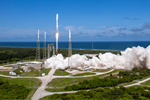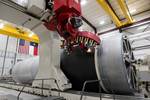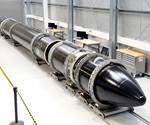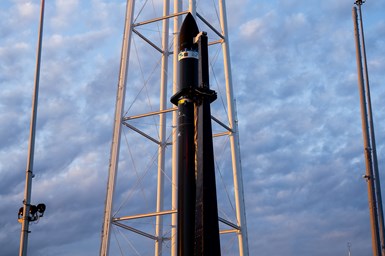Rocket Lab receives U.S. Space Force launch contract for DOD operations
The mission will be Rocket Lab’s third for the U.S. Space Force, further strengthening the use of its Electron carbon fiber composite rocket as a reliable and responsive small launch vehicle.
End-to-end space company Rocket Lab USA Inc. (Long Beach, Calif., U.S.) has been awarded a $14.49 million task order by the U.S. Space Force (USSF) to launch an Electron mission from Launch Complex 2. The mission, called Space Test Program-30 (STP-S30) falls under the Space Systems Command (SSC) Assured Access to Space organization and is part of Orbital Services Program-4 (OSP-4).
Electron is a reusable orbital-class small rocket and is contended to be the second most frequently launched rocket in the U.S. Featuring a carbon fiber composite structure, the vehicle has delivered missions for commercial and government satellite operators.
The dedicated Electron launch is scheduled to take place within 24 months from contract award and will lift off from Launch Complex 2, a dedicated pad for the Electron rocket at Virginia Spaceport Authority’s Mid-Atlantic Regional Spaceport within the NASA Wallops Flight Facility on Virginia’s eastern shore. STP-S30 is a complex mission that will deliver research experiments and technology demonstrations to orbit for the Department of Defense (DOD) and contribute to future space systems development. The projected primary payload, DISKSat, will demonstrate sustained very low earth orbit (VLEO) flight and test a 1-meter diameter, disk-shaped satellite bus that is designed to increase on-orbit persistence.
“Flexible, responsive and reliable launch is critical to ensuring resilient space capabilities for the nation and we’re proud to deliver it to the Space Force once again with Electron,” says Rocket Lab founder and CEO Peter Beck. “After more than 40 successful launches from pads spanning both hemispheres, we’ve delivered time and time again for the DOD, national security and commercial space users alike, cementing Electron’s position as the leading small launch solution globally. We’re excited to demonstrate this combination of mature-proven execution, speed and agility for STP-S30.”
Rocket Lab has a long track record of delivering mission success for the USSF on Electron, including the successful launch of an Air Force Research Laboratory-sponsored demonstration satellite called Monolith in 2021, and the successful launch of the STP-27RD mission R&D satellites for the DOD in 2019. Rocket Lab is also working closely with the USSF for the development of the company’s new medium-lift vehicle, Neutron — also comprising a composite structure — through a $24.35 million contract with SSC to support development of Neutron’s upper stage.
Rocket Lab USA offers extensive capabilities in the composites field, from primary structures to composite tanks to structural panels and assemblies and custom projects. Learn more here.
Related Content
-
Orbital Composites wins award from U.S. Space Force to build space factories for antennas
Partners Axiom Space, Northrop Grumman Space Logistics and Southwest Research Institute will help advance ISAM technologies for kilometer-scale LEO antennas, space stations and GEO applications, targeting space factory in 3-5 years.
-
A new era for ceramic matrix composites
CMC is expanding, with new fiber production in Europe, faster processes and higher temperature materials enabling applications for industry, hypersonics and New Space.
-
On the radar: Cryogenic testing of composites for future hydrogen storage
Netherlands, U.K., France, Germany and the U.S. build up test capability, look at thermoset and thermoplastic composite materials.

















